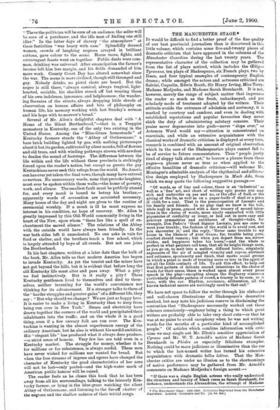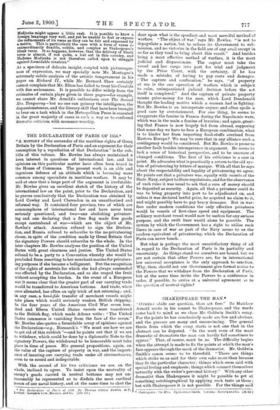THE MANCHESTER STAGE.*
IT would be difficult to find a better proof of the fine quality
of our best provincial journalism than is discovered in this little volume, which contains some five-and-twenty pieces of dramatic criticism that have appeared in the columns of the Manchester Guardian during the last twenty years. The representative character of the collection may be gathered from the list of plays noticed, which includes the (Edipus Tyrannus, ten plays of Shakespeare, six French plays, two by Ibsen, and four typical examples of contemporary English drama; while amongst the actors and actresses criticised are Salvini, Coquelin, Edwin Booth, Sir Henry Irving, Miss Terry, Madame Modjeska, and Madame Sarah Bernhardt. It is not, however, merely the range of subject matter that impresses the reader so much as the fresh, unhackneyed, and yet scholarly mode of treatment adopted by the writers. Their attitude avoids the extremes of adulation and acrimony, it is marked by courtesy and candour, and even in dealing with established reputations and popular favourites they never shirk the duty of administering salutary censure. Their praise never degenerates into gush—never "slops over," as Artemus Ward would say — attention is concentrated on essentials, and while an extensive acquaintance with the classical works of dramatic criticism is displayed at every turn,
research is combined with an amount of original observation which in the case of the Shakespearian plays cannot fail to be of service to future commentators. Thus "people justly
tired of sloppy talk about art," to borrow a phrase from these pages—a plunge never so true as when applied to the effusive banalities of dramatic criticism—will welcome Mr. Montague's admirable analysis of the rhythmical and allitera-
tive design employed by Shakespeare in Much Ado, from which we may quote the following suggestive passage :— " Of words, as of line and colour, there is an ' industrial ' as well as a fine' art, and short of writing epic poems you may etch and embroider on yes and no, or the offer of food, or the giving of the lie, as well as on a paper-knife of steel or a piece of cloth for a coat. That is the preoccupation of Leonato and his family and friends. In no play that we know is the talk, while kept in prose, graced with a finer tracery of second inten- tions in the choice of words, more nicely enamelled with little piquancies of cordiality or irony, or laid out in more easy and gracious symmetries and antitheses of thought—take, for example, Don Petho's Good Signior Leonato, you are come to meet your trouble; the fashion of the world is to avoid cost, and you encounter it,' and the reply, Never came trouble to my house in the likeness of your Grace; for trouble being gone, comfort should remain ; but when you depart from me, sorrow abides, and happiness takes his leave,'—and the whole so perfect in what painters call tone, that all its bright things seem, as you go on, to melt into a mellow, diffused lustre, singularly expressive of the air of mingled vivacity and repose. alertness and reticence, spontaneity and finish, that marks social groups in which a point is made of treating more or less in the spirit of art all the little contacts of life. To aid this effect, to help out that first pattern of delicate second intentions in the choice of words for their sense, there is worked upon almost every prose speech in the play—excepting always the Dogberry scenes—a particularly delicate pattern of sound, a tracery to be seen, as it were, with the ear. Rhythm, assonance, alliteration, all the known technical means are untiringly used to that end."
We have not space to follow the writer through his elaborate and well-chosen illustrations of Shakespeare's decorative method, but may note his judicious reserve in disdaining the contention that "Shakespeare necessarily worked out these schemes consciously—euphony being a thing to which great writers are probably able to take very short cuts—or that he was at no pains to avoid cacophony when he was not writing words for the mouths of a particular kind of accomplished people." Of articles which combine information.. with criti- cism we may single out Mr. Elton's sensitive appreciation of Cyrano and Mr. W. T. Arnold's notice of Madame Sarah Bernhardt in Phedre as especially felicitous examples. Nothing could be more judicious or illuminative than the use to which the last-named writer has turned his extensive acquaintance with dramatic belles lettres. That the Man- chester critics are under no illusion as to the shortcomings of native performers may be gathered from Mr. Arnold's
comments on Madame Modjeska's foreign accent:— "If there was a single English actress who really understood the structure and beauty of blank verse as Sarah Bernhardt, for instance, understands the Alexandrine, the attempt of Madame
• The Manchester Stage : 1830-1900. Criticisms Reprinted from the Manchester Guardian. Loudon: Constable and Co. [Ss. Si!. net.]
Modjeska might appear a little rash. It is possible to know a foreign language very well, and yet be unable to feel or express the refinements of its verse as they can be felt and expressed by a native. This is particularly the case with a form of verse so extraordinarily flexible, subtle, and complex as Shakespeare's blank verse. It so happens, however, that the delivery of blank verse is almost, if not quite, a lost art in this country, and Madame Modjeska is not therefore called upon to struggle against formidable rivalries."
.As a specimen of delicate insight, coupled with picturesque- ness of expression, we may specially note Mr. Montague's extremely subtle analysis of the artistic temperament in his paper on Itichard IL, while Mr. Bernard Shaw certainly cannot complain that Mr. Elton has failed to treat his Candida with due seriousness. It is possible to differ widely from the estimates of certain plays given in these pages—for example, we cannot share Mr. Arnold's enthusiasm over The Second Mrs. Tanqueray—but no one can gainsay the intelligence, the dispassionateness, and the literary skill that have been brought to bear on a task which in the Metropolitan Press is executed in the great majority of cases in such a way as to confound dramatic criticism with mummer-worship.



































 Previous page
Previous page